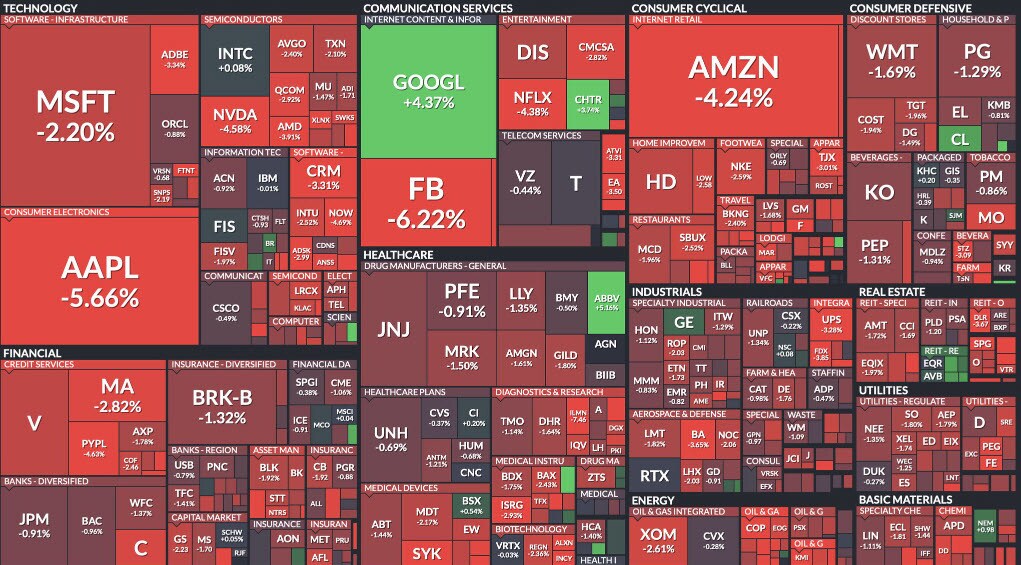Saturday night was the last Saturday a Halloween occurs on a full blue moon for the next 146 years, thus, perhaps our current global economic conditions are once-in-a-blue-moon occurrence too. As Elton John wrote, “This boy’s too young to be singing the blues, ah, ah..”
With a confluence of events, i.e., an election, lack of stimulus, huge earnings season, rising COVID-19 cases, we are watching four major trend changes emerge.
Has the whole market topped with NASDAQ and tech leading the shift, which causes all the indices and many sectors to fall precipitously?
Several factors are at play to support this trend.
The several factors at play
First, the earnings of the FAANG stocks, Amazon, Apple, Netflix, Facebook, although beating on the numbers, have not produced a rally. All but Alphabet (GOOG) closed Friday deep in the red. GOOG closed green, but well under the swing high from 2 weeks ago.
Since big tech bottomed in 2012 and has led the market up for over eight years, that tech is tired and needs to drop in price before finding a level of support, which totally makes sense.

With a stay-at-home environment, tech will remain a necessity. However, the shift from the behemoth stocks with little upside, to the small cap growth stocks with good balance sheets will become the better opportunity.
Technically, NASDAQ has a double top on the charts if you look at the peak high in September, and the peak high in October. Should the QQQs fail $260, the price could fall to $240 quickly.
Unless the U.S. government has a lame duck session before November 3rd, the lack of an agreed upon stimulus package, a bleak holiday season for big tech could be on the horizon. In the words of Elton John,
So goodbye yellow brick road
Where the dogs of society howl
You can't plant me in your penthouse
I'm going back to my plough
Then there is the surge in COVID leading to a lockdown in Europe, with the potential for the U.S to follow suit.
Depending how much investors decide they like/dislike the election results, another theme is that tech and NASDAQ have topped, but the decline in price will be gentle, while the money rotates into small caps, small-cap growth stocks, transportation and financials.
A major factor in play here is not only who wins the election, but also whether there is gridlock (blue senate, red president or vice versa). Historically in a gridlock, nothing much gets done. The market will not like that.
Naturally, we also must factor in the enduring results of the pandemic to the global financial economies as well as when and what stimulus comes and looks like.
We must also brace ourselves for the possibility that everything sells off and then just stagnates given rising debt and growing money supply along with food and commodity shortages. Hence, theme three is a stagflation environment.
In the case of stagflation, regardless of who wins, once the pandemic fades, consumption returns, supply remains limited, the dollar falls, or if the world environment destabilizes, expect raw material hoarding; thus, forcing the central banks to become less accommodative leading to a market sell off.
What about China? Will it outperform the U.S.? As of Friday, the ETF FXI sits in a bullish phase while the US indices have flashed caution.
China can surely outperform the U.S. if China does not get another virus surge and their economy continues to grow. A continuing trade war will likely hurt the U.S. more than it would hurt China.
Finally, there is one other potential trend - everything rallies - and the world sings I’m Still Standing!
Bio
Michele 'Mish' Schneider currently serves as Director of Trading Research and Education at MarketGauge.com. She writes and produces daily market analysis in "Mish's Daily", and serves as a developer and trading mentor in several of our trading services, drawing on her 30+ Years of Trading and Teaching Experience.
Mish is a former floor trader on several New York Commodity Exchanges, including Coffee, Sugar and Cocoa, NYMEX and FINEX in NYC. While on the trading floor Mish also served as a market analyst for two of the largest commodity trading firms at the time - Continental Grain, and Conti-Commodities.
Mish also wrote the best-selling finance book, Plant Your Money Tree; A Guide To Growing Your Wealth.
Disclaimer Past performance is not a reliable indicator of future results.
CMC Markets is an execution-only service provider. The material (whether or not it states any opinions) is for general information purposes only, and does not take into account your personal circumstances or objectives. Nothing in this material is (or should be considered to be) financial, investment or other advice on which reliance should be placed. No opinion given in the material constitutes a recommendation by CMC Markets or the author that any particular investment, security, transaction or investment strategy is suitable for any specific person.
The material has not been prepared in accordance with legal requirements designed to promote the independence of investment research. Although we are not specifically prevented from dealing before providing this material, we do not seek to take advantage of the material prior to its dissemination.
CMC Markets does not endorse or offer opinion on the trading strategies used by the author. Their trading strategies do not guarantee any return and CMC Markets shall not be held responsible for any loss that you may incur, either directly or indirectly, arising from any investment based on any information contained herein.
*Tax treatment depends on individual circumstances and can change or may differ in a jurisdiction other than the UK.
Continue reading for FREE
- Includes free newsletter updates, unsubscribe anytime. Privacy policy






